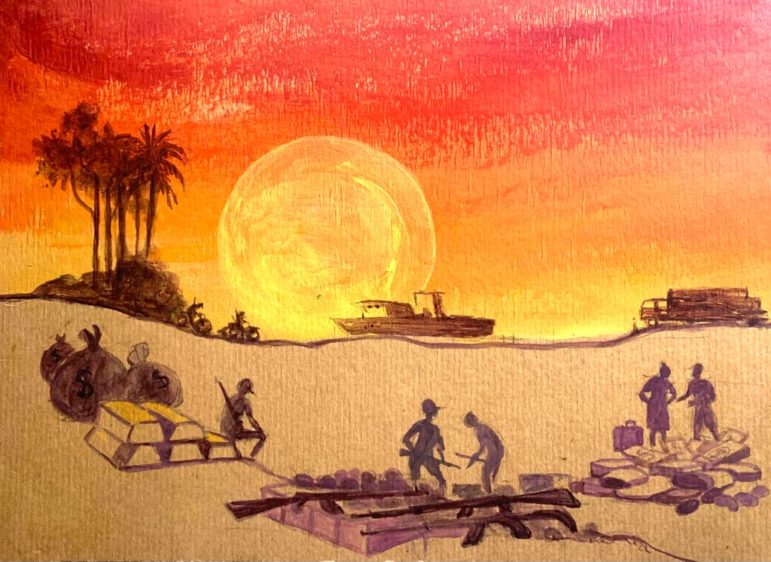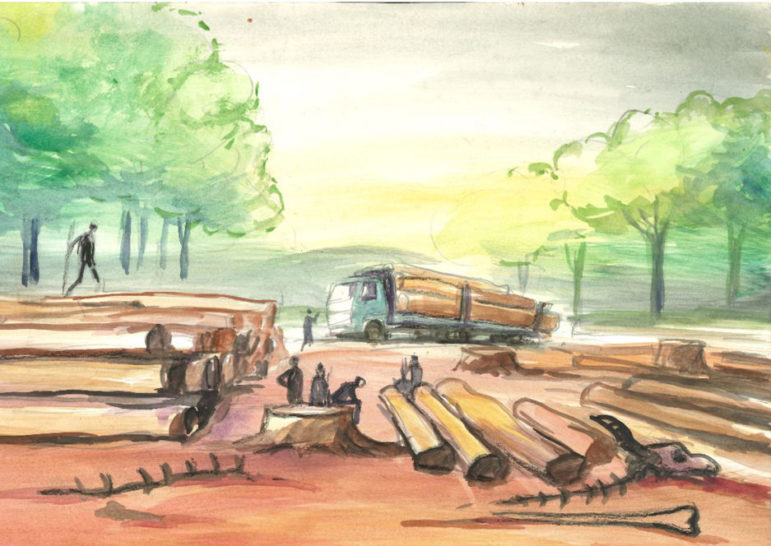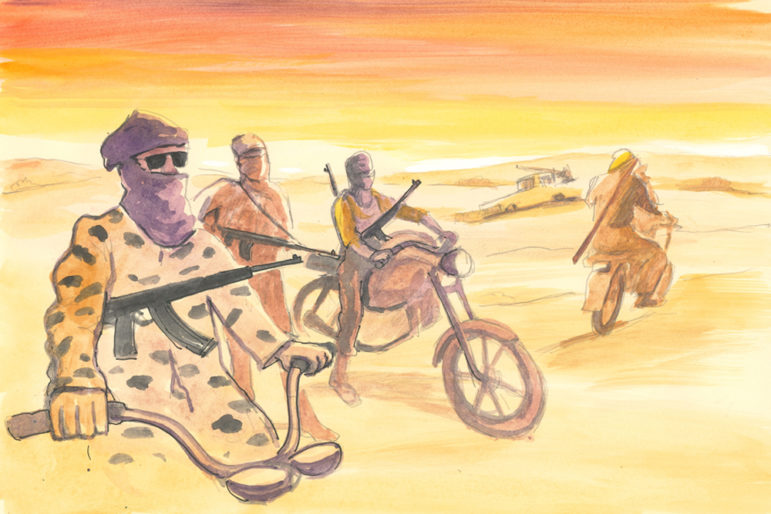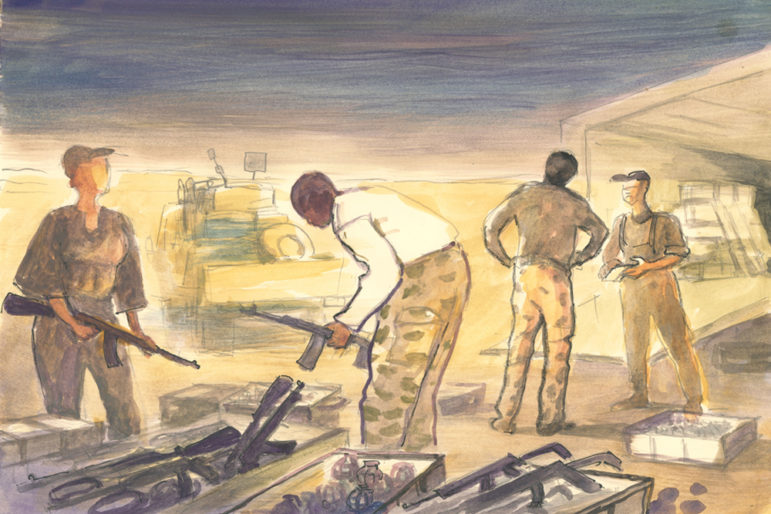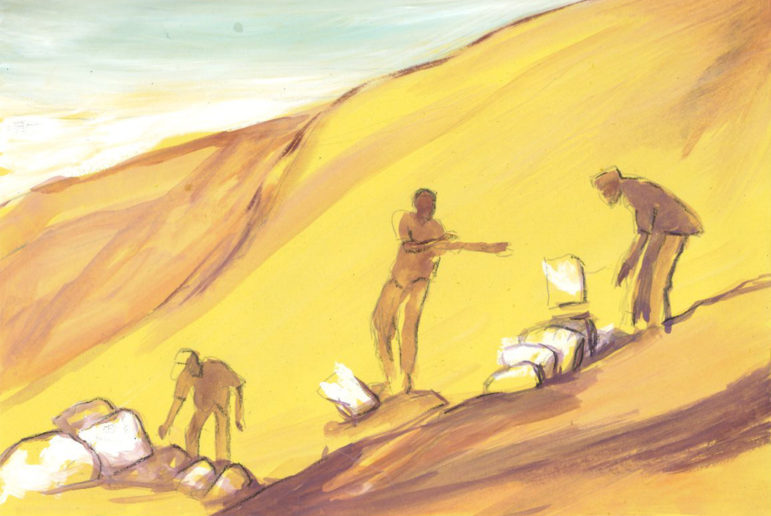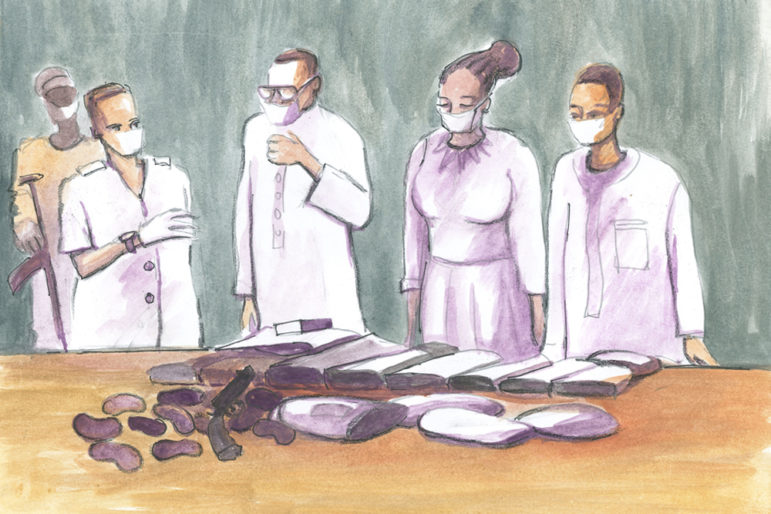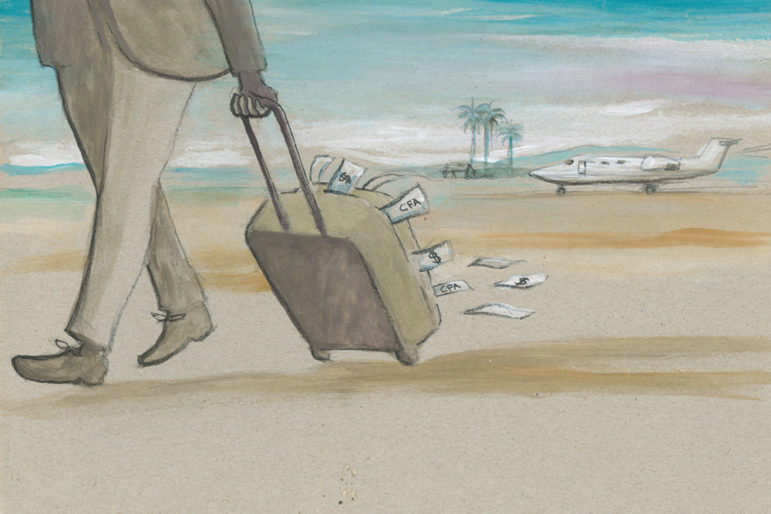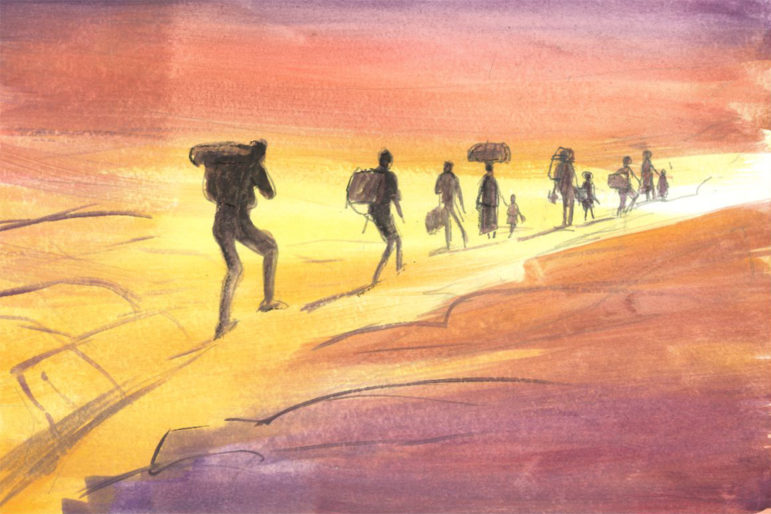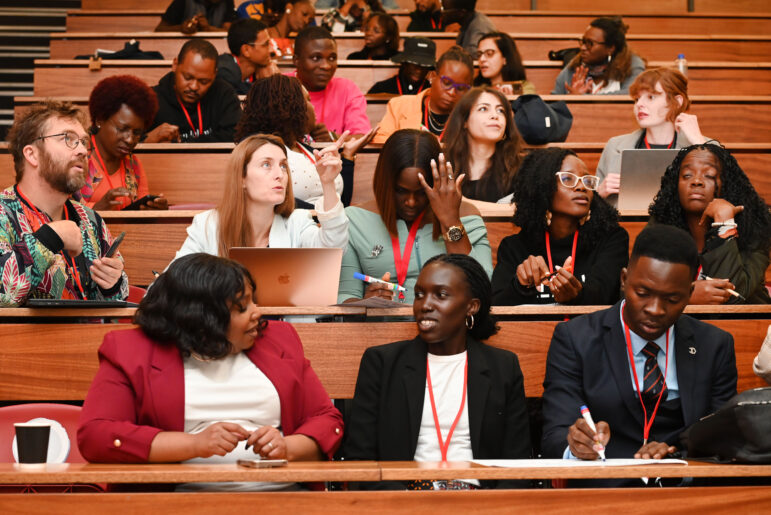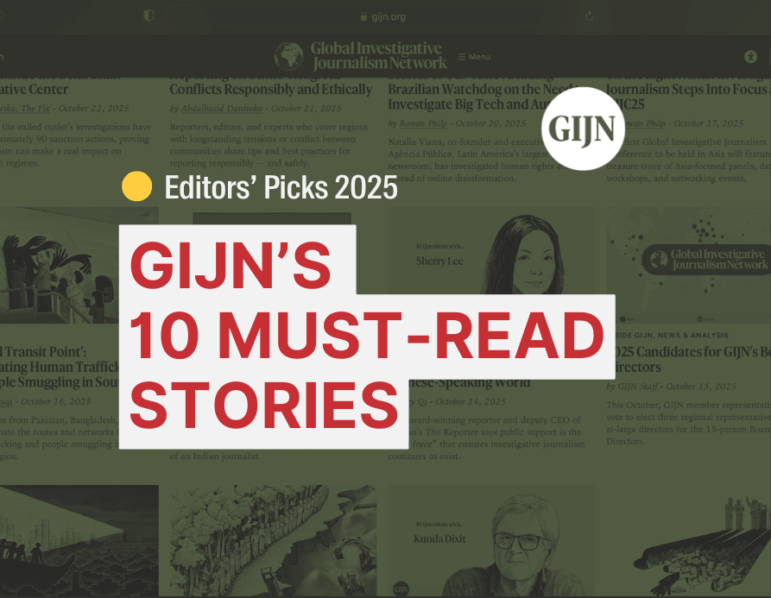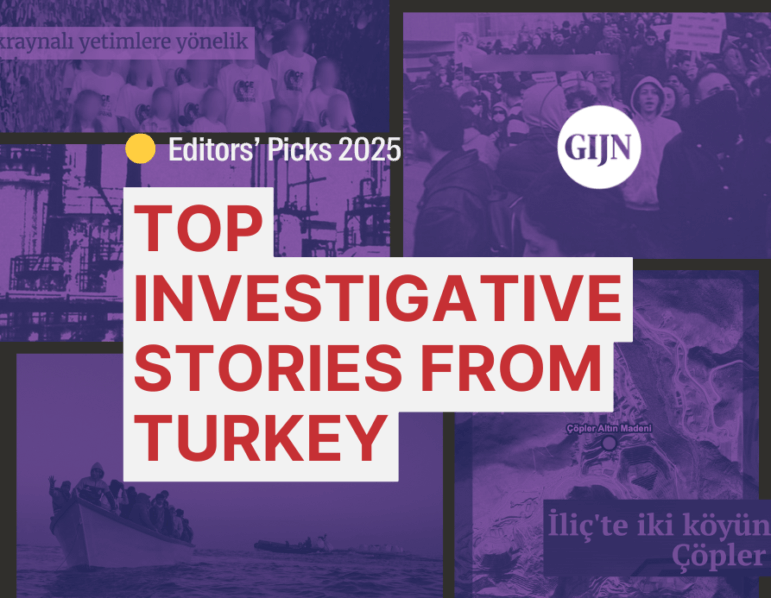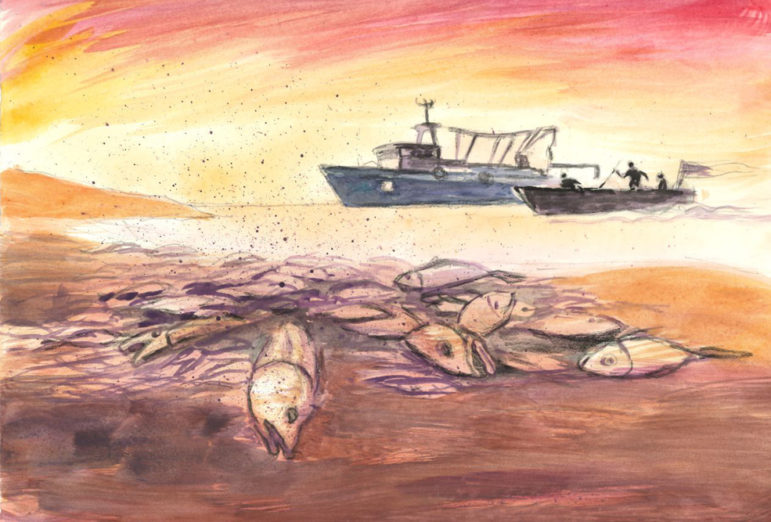

Guide to Investigating Organized Crime in Africa: Chapter 3 — Crimes on the Oceans
Read this article in
Guide Resource
Guide to Investigating Organized Crime in Africa
Chapter Guide Resource
Guide to Investigating Organized Crime in Africa — Introduction
Chapter Guide Resource
Guide to Investigating Organized Crime in Africa: Chapter 1 — Environmental Crimes
Chapter Guide Resource
Guide to Investigating Organized Crime in Africa: Chapter 2 — Terrorist and Militia Groups
Chapter Guide Resource
Guide to Investigating Organized Crime in Africa: Chapter 3 — Crimes on the Oceans
Chapter Guide Resource
Guide to Investigating Organized Crime in Africa: Chapter 4 — Arms Trafficking
Chapter Guide Resource
Guide to Investigating Organized Crime in Africa: Chapter 5 — Natural Resources Theft
Chapter Guide Resource
Guide to Investigating Organized Crime in Africa: Chapter 6 — Drug Trafficking
Chapter Guide Resource
Guide to Investigating Organized Crime in Africa: Chapter 7 — Financial Crimes
Chapter Guide Resource
Guide to Investigating Organized Crime in Africa: Chapter 8 — Kleptocracies
Chapter Guide Resource
Guide to Investigating Organized Crime in Africa: Chapter 9 — Other Crimes
Ocean-related crimes are among the world’s most lucrative illicit activities. For instance, according to a 2020 paper in Science Advances — a journal published by the American Association for the Advancement of Science — illicit trade in marine fish catch creates an estimated loss in annual economic impact of between US$26 and US$50 billion annually. Africa’s share of this loss is estimated to be between US$7.6 billion and US$13.9 billion.
There are many types of crimes committed on the world’s oceans — corruption, drug smuggling, and human trafficking, for example — but two of the most significant across Africa are maritime piracy and what experts call illegal, unreported, and unregulated (IUU) fishing.
So prevalent are IUU fishing activities in West Africa that it comprises up to 37% of the region’s catch, according to a report by the Environmental Justice Foundation. Off-the-books fishing has serious consequences for food security, people’s livelihoods in coastal regions, and the environmental health of the seas. For example, a story focused on how poaching threatens Sierra Leone’s small-scale fishermen notes that 230,000 people in the country directly depend on the ocean for their livelihoods. Coverage of this issue often focuses only on the illegal activities by trawler vessels and their foreign connections, but journalists will find many more layers, people, and issues connected to IUU fishing. Among them are the lack of enforcement by state officials, ineffective laws and regulations, and threats posed to biodiversity and local food supplies.
Along with IUU fishing, maritime piracy looms large in Africa. According to the International Maritime Organization, piracy and armed robbery involve acts of violence or detention “on the high seas, committed for private ends by the crew or the passengers of a private boat, ship or a private aircraft” against another boat, ship, or aircraft in a state’s internal waters, archipelagic waters, and territorial sea. Anti-piracy measures are estimated to cost African countries over US$500 million annually, according to a study by the NGO Stable Seas.
For years, the Horn of Africa was the continent’s high-risk area for piracy, but incidents in the region have fallen sharply since 2009. The focus today is on the Gulf of Guinea, a strategic swath of ocean reaching a dozen countries on the West African coast. According to the International Maritime Bureau, in 2019 an estimated 90% of worldwide reported kidnappings at sea occurred in the Gulf of Guinea. The Gulf is also a center for drug trafficking, smuggling, illegal fishing, and fuel theft. A 2015 survey of maritime pirates, conducted on prison inmates by the UN Office on Drugs and Crime, found that poor economic conditions are a major driver of piracy across the continent.
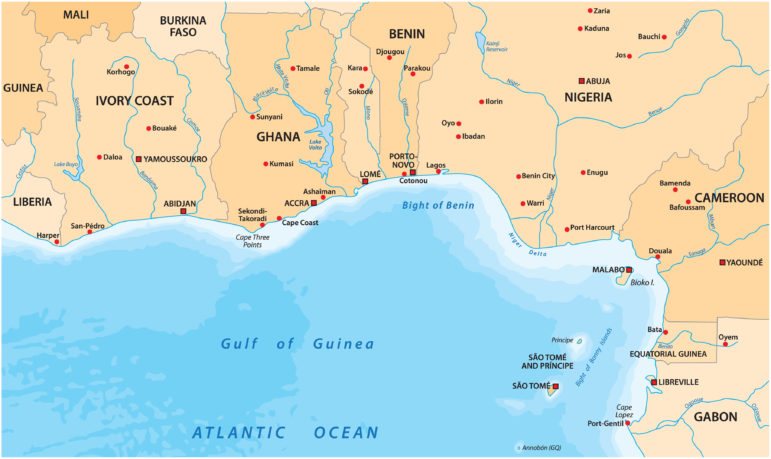
In 2019, the Gulf of Guinea, touching a dozen African countries from Senegal to Angola, was home to an estimated 90% of the world’s kidnappings at sea. Image: Shutterstock
Illegal Fishing
Illegal fishing activities can be grouped into three main activities, according to the UN’s Food and Agriculture Organization (FAO):
- “Conducted by national or foreign vessels in waters under the jurisdiction of a state, without the permission of that state, or in contravention of its laws and regulations.”
- “Conducted by vessels flying the flag of States that are parties to a relevant regional fisheries management organization but operate in contravention of the conservation and management measures adopted by that organization and by which the States are bound, or relevant provisions of the applicable international law” or
- “In violation of national laws or international obligations, including those undertaken by cooperating States to a relevant regional fisheries management organization.”
Reporters investigating illegal fishing should research national laws and regulations governing fishing activities. Access to court records, expert sources, and police charge sheets are important sources of information that will help define the nature of the crime being investigated and provide helpful leads. Specific crimes such as fishing inside exclusion zones, use of unauthorized and harmful chemicals in fishing, covering of vessel identification markings, bribing officials, disregarding authorities’ commands to stop at checkpoints, and seeking refuge abroad to evade arrest may fall under illegal fishing practices. For example, in 2018, three fishing vessels were arrested by the Gabonese navy for fishing in a marine protected area.
Unreported Fishing
Unreported fishing is defined as when licensed fishing vessels fail to disclose their catch to local or national authorities. It also includes such crimes as transshipment of fish — transferring catch between vessels — illegally at sea, using banned fishing equipment, labor violations, human trafficking, or slavery at sea.
The FAO categorizes unreported fishing into two main areas:
- Catches that “have not been reported, or have been misreported, to the relevant national authority, in contravention of national laws and regulations; and”
- Catches “that are undertaken in the area of competence of a relevant regional fisheries management organization that have not been reported or have been misreported, in contravention of the reporting procedures of that organization.”
In Africa, unreported fishing is normally undertaken by foreign vessels which may not hold the requisite license. Investigating unreported fishing poses challenges for journalists, because they frequently depend on fishing observers or undercover agents to reveal the nature of the unreported crime. One way to find evidence is to check fish landings data reported by port officials, and import/export data sources. This can help detect if a vessel has targeted a prohibited or protected species.
Unregulated Fishing
Unregulated fishing is just what the name implies: a lack of regulations or laws to control what is happening with a region’s fishing industry. The FAO characterizes unregulated fishing activities as when “there are no applicable conservation or management measures and where such fishing activities are conducted in a manner inconsistent with State responsibilities for the conservation of living marine resources under international law.”
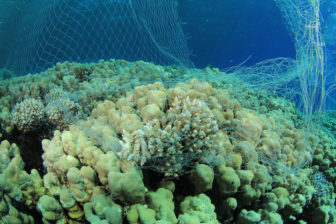
Illegal fishing equipment such as poachers’ nets can damage coral and kill fish. Image: Shutterstock
Vessels that are likely to engage in unregulated fishing often turn off or disable their Automatic Identification Systems (AIS) transponders — devices that tell authorities a ship’s position and identification. International maritime law requires AIS transponders to be fitted and activated on all passenger ships, ships of 300 gross tons or more on international voyages, and cargo ships of 500 tons or more.
Piracy Activities
Covering piracy is inherently difficult and can be very dangerous. Journalists should take extra precautions and understand the complex factors at work.
For example, piracy actors in the Gulf of Guinea consist of two main groups, according to Dirk Siebels, an African maritime security expert at Risk Intelligence, a Denmark-based security firm. There are piracy groups from local communities who have access to a boat and may target cargo at sea that can be easily sold on the black market or local market. This type of crime, Siebels says, is usually “locally connected and not very organized.”
Other groups, however, are more sophisticated and engage in higher-profile crimes such as kidnapping. For these groups to successfully execute a kidnap-for-ransom operation, they must have hostage camps, foot soldiers on land to guard the hostages, and protection from law enforcement and rival gangs.
“You need a whole set of infrastructure on land and, by definition, that is very organized crime,” Siebels notes. “These groups do not only engage in kidnapping seafarers, they might also engage in kidnapping people on land, fuel smuggling, illegal refining, and smuggling other kinds of things.”
Journalists who intend to report on piracy should understand the multi-dimensional nature of the problem, including how piracy is tied to political instability, conflict, and poverty in Africa, and the direct costs associated with the crime such as naval expenses, ransoms paid, and the value of stolen oil and cargo.
Journalists may also consider covering piracy’s indirect impacts, such as financial damage to coastal economies. These damages may include reduced shipping traffic to high-risk areas, increased insurance costs, and decreased fishing activity.
There can also be a focus on the opportunity cost. What are the consequences of political will and financial resources being concentrated on piracy, rather than other priorities that might attract more investment were piracy eradicated? Could financial resources committed to piracy be invested in education, healthcare, or infrastructure?
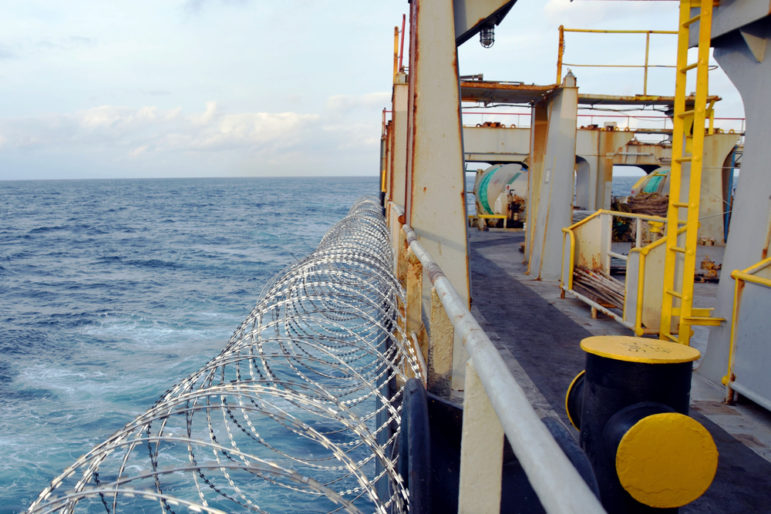
Razor wire attached to a ship hull and railings to protect the crew against piracy attacks in the Gulf of Guinea. Image: Shutterstock
Above all, reporters must carefully weigh the risks. This is a dangerous industry, and you need to take precautionary measures if you intend to engage an active or inactive pirate as part of your investigation. A veteran investigative journalist who has covered piracy, but didn’t want to be named due to threats he’s faced in the past, shared the following advice:
Put in place a risk assessment:
- Do not go in blindly. Your team must be aware of where you are and how long it will take to get back. You must understand the landscape of the place and conduct a thorough background check on people you want to interview.
- What happens if something goes wrong? Who do you call or text? What will the exit strategy be? You must have all necessary mitigation measures in place.
Fixers and local reporters:
- You should be extremely careful with whom you work. Do a thorough background check on local reporters and fixers.
- Adequately vet networks that put you in touch with these local reporters and fixers.
Context and culture:
- You need to thoroughly research and understand the culture of the person or people you want to interview.
- Show respect for the people involved. Avoid being judgmental or confrontational.
- Be sensitive to their religious beliefs and culture. Have an open mind.
Tips and Tools
Whether you are investigating IUU fishing, piracy, or other criminal activity on the seas, there are a number of proven techniques to help your reporting.
Begin your project as you would any investigation — by gathering all relevant data:
- Use appropriate freedom of information laws in respective African countries to gather and retrieve information from official sources. Leaked documents can also play an important role during investigations.
- Reporters should consider as a priority to engage independent civil society organizations, academics, and NGO experts such as The Fisheries Committee for the West Central Gulf of Guinea and the Sustainable Fisheries Management Project. They may be well placed to provide more information about the nature of the crime being investigated and potential leads.
- For piracy investigations, primary sources are always the most valuable. Reach out to victims and survivors, friends, and families of the victims, and convicted pirates. Track down court documents, and data gathered by law enforcement agencies. Reporters must take into consideration the mental state and trauma experienced by victims and survivors of piracy before approaching them for an interview. GIJN has an article on Tips for Interviewing Victims of Tragedy, Witnesses, and Survivors.
- The transnational nature of ocean-related crime makes it ideal to work on as a cross-border collaborative project.
- When illegal fishing involves publicly traded foreign companies, review the financial records they need to file at stock exchanges and with regulators. The Shanghai Stock Exchange and the Shenzhen Stock Exchange can be great assets when investigating publicly traded companies connected to China.
Important Sources
Global Fishing Watch is an open-access online tool for visualization and analysis of vessel-based human activity at sea. This platform helps journalists identify IUU activities across the world.
Environmental Justice Foundation is an NGO that investigates, documents, and exposes environmental and human rights abuses, with significant work focused on Africa.
The European Market Observatory for Fisheries and Aquaculture Products (EUMOFA) offers a helpful database of aggregated data and a large network of experts in fisheries and aquaculture. Data on fishery products exported from Africa to the EU market can be accessed here.
The EU Traces platform facilitates the exchange of data, information and documents between all involved trading parties and control authorities. Data on fishery export licenses held by companies from Africa can be accessed on this platform.
Case Studies
Stolen at Sea: An Investigation into Illegal Chinese Transshipment Activities in Ghana and Nigeria, iWatch Africa (2020)
Emmanuel Essien, a 28-year-old fishing observer employed by the Fisheries Ministry of Ghana, went missing while onboard a Chinese-owned trawler in 2019. Evidence obtained from the last vessel he worked on showed he was trying to stop vessels engaged in illegal fishing practices. Emmanuel’s unsolved case points to a broader story of illegal transshipment activities by Chinese-fronted vessels off the coasts of Ghana and Nigeria. It relied on information from the European Traces platform, public reports from the Chinese stock exchange, witnesses, and civil society experts.
How Modern Pirates Are Still a Threat in the Coast of Africa, ENDEVR (2016)
In this documentary by ENDEVR, investigators show how modern pirates in Nigeria and Somali target the oil firms, whom they accuse of pillaging the nation’s natural riches without providing anything in return, and turn kidnapping into a business. Reporters tracked soldiers, sailors and pirates for months to reveal how they operated.
The Hunt for the Modern-Day Pirates Who Steal Millions of Tons of Fish from the Seas, Smithsonian Magazine (2020)
When a Cambodian-flagged cargo ship falsely claims that its frozen toothfish pieces are from the Antarctic, it instantly generates doubt. Officials from Namibia refuse to let it in, and the rest of the investigation takes readers through the murky world of illicit fishing — the businesses that finance it and the harm they bring to delicate ocean ecosystems. To cover this study, writer Tristram Korten consulted with experts and officials from more than 10 countries, and went through “hundreds of pages of reports.”
Table of Contents | Introduction | Chapter 1 | Chapter 2 | Chapter 4 | Chapter 5 | Chapter 6 | Chapter 7 | Chapter 8 | Chapter 9
Additional Resources
Reporter’s Guide to Investigating Organized Crime
How an Award-Winning, Cross-Border Project Investigated on the Open Ocean
The Rise of African Environmental Investigative Journalism
 Gideon Sarpong is a media practitioner with a decade of experience in policy, data, and investigative journalism. He is a co-founder of iWatch Africa, an alumnus of the Young African Leaders Initiative, a Reuters Fellow at the University of Oxford and a 2022 Thomson Reuters Foundation/Trust Conference Changemaker.
Gideon Sarpong is a media practitioner with a decade of experience in policy, data, and investigative journalism. He is a co-founder of iWatch Africa, an alumnus of the Young African Leaders Initiative, a Reuters Fellow at the University of Oxford and a 2022 Thomson Reuters Foundation/Trust Conference Changemaker.

